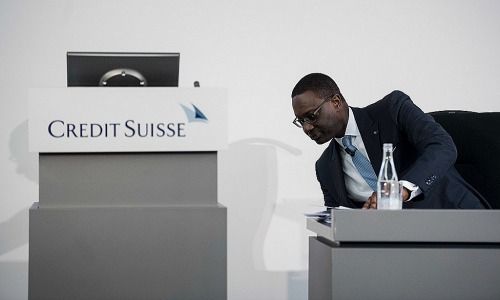Tidjane Thiam's Breakthrough?
Tidjane Thiam had his back against the wall for most of the first half of 2016. Now, signs are mounting that the Credit Suisse boss is about to reap the first fruits of his labors at the Swiss bank.
Credit Suisse CEO Tidjane Thiam’s first nine months of this year were no cakewalk: first he surprised investors with a hefty write-down and was forced to tweak the numbers on his strategy. Then the bank’s stock slid, while investment bankers plotted a very public mutiny, as finews.asia has reported.
The situation didn’t ease until July, when Thiam was able to present surprisingly good second-quarter results – and this against the backdrop of extremely high stock market volatility, reticent clients, Brexit and increasingly ineffective central bank stimulus policy.
Flash in the Pan?
The result quieted Credit Suisse’s detractors: investors who bought the bank’s shares at the beginning of the year has boast a 40 percent gain on the stock.
Was it just a flash in the pan? Hardly: signs indicate that Thiam will present a better-than-expected results when the bank reports third-quarter results on Thursday, November 3.
1. Bank for Entrepreneurs
UBS’ results illustrated that Swiss banking operations are in rude health. Both big banks have rediscovered their love of domestic operations and will have been able to benefit from two areas. The first is entrepreneurs and executives, which Credit Suisse has aimed at with its entrepreneur’s banks. But Credit Suisse is also ahead with very young clients between 15 and 25, thanks in part to its strong digital and fintech offering.
Credit Suisse’s corporate client business continues to do well, and last but not least the bank will ensure its Swiss Universal Bank, led by Thomas Gottstein, looks its best when it is carved out on November 21.
2. Making Peace with Prima Donnas
The bank still has a substantial investment banking arm, even if it has scaled back in the last 12 months. Thiam doesn't want to pare the heavyweight unit back as far as some commentators believe: he can’t afford to entirely forgo revenues from a recent fixed income trading wave. This was illustrated by Deutsche Bank last week, which reported a surprise profit in part due to a favorable showing from its investment bank, as finews.asia reported.
Credit Suisse is strong is two main areas: M&A and debt products. Following Deutsche’s example, the Swiss bank’s investment banking arm can be expected to put in a good quarterly showing. This should go some way to mending Thiam’s relations with Credit Suisse’s powerful investment banker faction.
3. Secret Powerhouse
Credit Suisse’s Asia arm enjoys far more autonomy and influence than other units closer to home – it is also the fastest-growing division, and even competitors attest to the Swiss bank’s rapid growth. The «entrepreneur’s bank» concept, which Gottstein is now proffering in Switzerland as well, works especially well in Asia.
Credit Suisse has also launched a staff offensive in Asia aimed at acquiring net new money with high-quality client advisors, instead of with a possibly risky takeover of a rival private bank. Expectations are high for the overall Asia division, run by Helman Sitohang.
4. Turnaround... What Now?
Last summer, Credit Suisse’s highest private banker, Iqbal Khan, reached the turnaround of the bank’s international wealth management division, as finews.asia reported.
That means Khan has laid the foundation for higher revenue, which should show even more strongly in the third quarter – even if he is still some distance from a 2.1 billion franc pretax profit target by the end of 2018.
5. Strong Employee Choice
Credit Suisse has made countless operative and strategic moves since the beginning of the year, and managed to attract several prominent bankers, as finews.asia has variously reported. This speaks for the bank’s ability to offer top staff the prospect of the firm’s successful and sustainable turnaround.
But risks remain and it would be biased to accentuate the positive only. Credit Suisse still faces huge challenges, among them sanctions for its wrong-doing prior to the financial crisis. Fines and other penalties will eat into capital and into profits which could otherwise be paid out to shareholders.
And since the environment for banks is getting bleaker and crimping growth opportunities, Credit Suisse will probably not be able to get around more cost-cutting. A tougher competitive environment and technology advances are thinning margins.
6. Hesitation Threatens to Curdle
The biggest challenge for banks is that clients remain in lethargy about their money, and aren’t prepared to put large chunks of their wealth into play by investing. As long as this passivity persists, banks will struggle with revenue and ultimately profitability, as illustrated by UBS.
This hesitation by clients could curdle into a more permanent disillusionment in financial matters, which would be a massive blow for banks in general.























